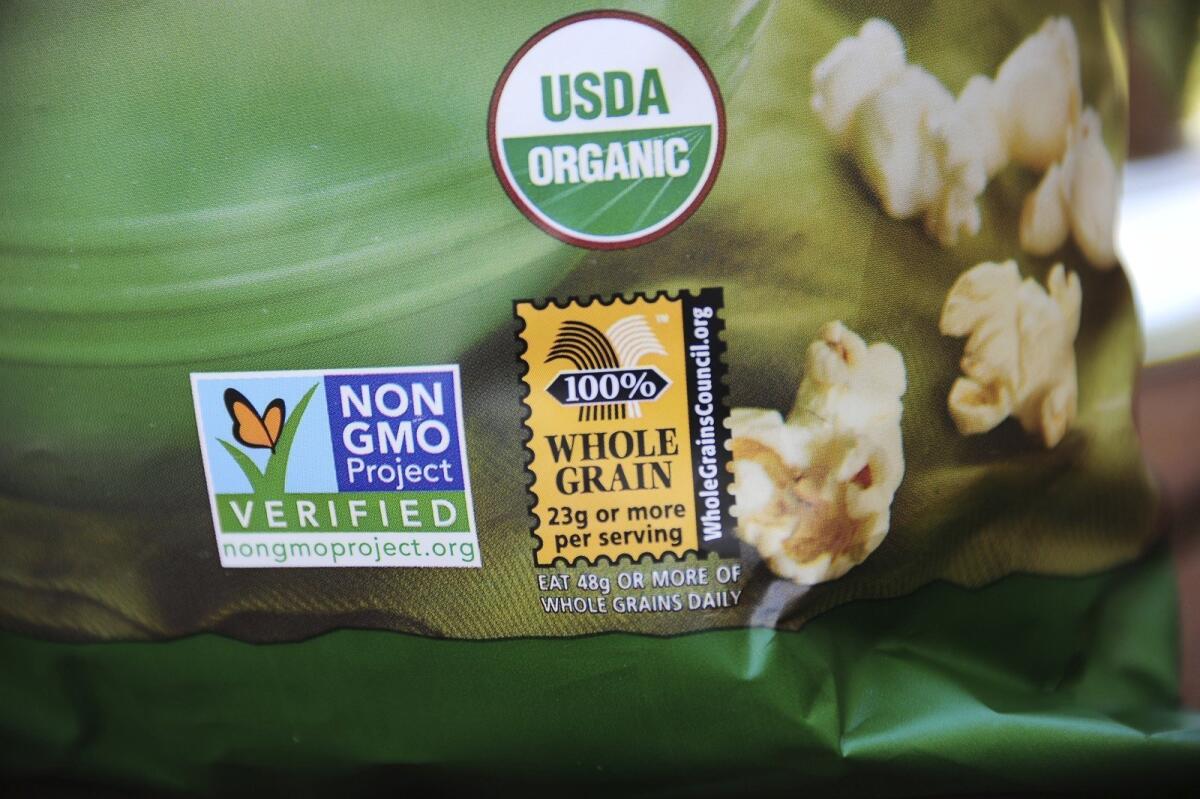GMO controversy: When do demands for scientists’ records turn into harassment?

Portrait of a politicized scientific issue: Non-GMO labels on food.
The debate over genetically modified organisms in our food is one of our two most politicized scientific discussions, along with those on climate change.
In each case, the scientific consensus is firmly on one side: that GMOs are safe, and that human-induced climate change is real. Both fields involve the interests of huge corporations and have attracted political meddling. And in both fields, scientists doing important work have had their personal correspondence exposed to personal view and sometimes misrepresented.
The result is a drive among some academics to ratchet back Freedom-of-Information acts. Their goal is to keep personal information private, even when the targets of FOIA requests are public employees — faculty at state universities, for example. Not only academic freedom, but public records standards themselves have come into question.
The latest uproar involves GMO research. Public records requests by the anti-GMO group U.S. Right to Know yielded thousands of pages of emails purporting to show undisclosed relationships between GMO researchers and Monsanto, a major GMO manufacturer. A New York Times article based largely on those emails followed. Although the article detailed the ties of one scientist in the anti-GMO camp with the anti-GMO organic food industry, its main theme was that academic researchers had been enticed into lobbying for big GMO companies such as Monsanto. The headline read: “Food Industry Enlisted Academics in G.M.O. Lobbying War, Emails Show.”
Oakland-based U.S. Right to Know was founded by Gary Ruskin and Stacy Malkan, the promoters of Proposition 37, the unsuccessful 2012 California ballot measure that would have required the labeling of most genetically-engineered foods. Ruskin has said that his public records campaign is aimed at revealing when “taxpayer-paid employees front for private corporations and their slick PR firms.”
A chief focus of the Times report, and of USRTK’s email releases, was the relationship between Kevin Folta, the chairman of the horticultural sciences department at the University of Florida, and Monsanto, a leading producer of GMO products. Folta gave up 4,600 pages of emails in response to the organization’s FOIA request. The resulting reports implied that Folta in effect lobbied for Monsanto while accepting undisclosed payments from the company.
Folta says that’s a distortion of the relationship. Monsanto donated $25,000 to a departmental communications program, he says, and covered some of his travel expenses for speaking engagements. He says there were no undisclosed grants for his own plant research, and the departmental grant was disclosed by the university.
“This was a political hatchet job,” he says. “Everything was cherry-picked.”
Folta says he’s not opposed to holding scientists to high standards of transparency and disclosure and doesn’t think FOI laws should be limited. “Transparency is super-important and helps to build trust,” he told me. The danger of broad-brush public records requests aimed at academic researchers, he says, lies in how the records are used. “When you give someone who wants to destroy your career 4,600 pages of emails, they’ll pick and choose to construct a false narrative.”
He’s not alone in feeling targeted. A 2014 report by the Union of Concerned Scientists (entitled “Freedom to Bully”) observed that “some level of privacy is necessary for researchers to do their best work” and warned of public records demands aimed at “the personal documents, correspondence, and discussions that constitute the push and pull of the scientific process—venues that researchers use to challenge the ideas of others.”
It’s hard to avoid the conclusion that some demands for records from scientists are aimed at intimidation and harassment. Those include the 2010 demand from former Virginia Atty. Gen. Kenneth Cuccinelli, a climate change denier, for the records of former University of Virginia faculty member Michael Mann, a prominent researcher in the field. (The state Supreme Court eventually shut down Cuccinelli’s crusade.)
In 2011, operatives allegedly associated with GOP Gov. Scott Walker of Wisconsin demanded emails with key words such as “union,” and “recall” sent by William Cronon, a history professor at the University of Wisconsin who had been publicly critical of Walker.
The lessons from these episodes are clear: If you’re doing research in a politicized field or that implicates big corporations, expect to receive demands for your private or professional correspondence.
Academia is struggling to identify the line between transparency and harassment. “As a first principle, if you’re a public employee, your professional dealings should be subject to public scrutiny,” says UC Berkeley biologist Michael Eisen, a co-founder of the Public Library of Science, an open-access publisher of scientific papers. He says some public records requests “clearly are being used in an effort to harass and silence people, but it’s hard to see how to limit public records acts that wouldn’t cripple them.”
(PLoS became embroiled in the controversy over Folta’s emails when it published an article by journalists Charles Seife and Paul D. Thacker citing them, and withdrew the piece after Folta objected. The Times subsequently published a related op-ed by the two authors.)
Relationships between researchers and corporations involving GMOs may be especially vulnerable to caricature. Agronimist Andrew Kniss of the University of Wyoming argues that corporate funding for research into GMO crops is inevitable — in fact, desirable. Field studies can cost thousands of dollars a year. “I don’t receive a recurring budget from my university to do this type of work,” he explained recently. “The company who will receive revenue from the product should be the one footing the bill, not taxpayers.”
He says the check on undue influence by backers is scientific transparency: “It doesn’t matter whether I’m funded by Greenpeace or Monsanto, if I make a claim that isn’t supported by evidence, then you should call me out.”
The backers of anti-GMO research often don’t resemble mega-corporations like Monsanto. They’re promoters like Joseph Mercola, a hawker of “organic” nostrums, whose proteges may be just as subject to potential conflicts of interest but may not strike the public as sinister.
That puts pressure on scientists, news media and other users of public records hauls to be objective and informed about what they show.
“We have a responsibility to explain to the public what we do and why,” Eisen says. “People are always going to take things out of context, but if the information can be misinterpreted, our challenge is to explain it better.” He says the targeting of Folta, who doesn’t appear to have personally profited from any Monsanto funding, “did a disservice to the cause of transparency.... He didn’t break laws or violate university disclosure rules — is this really the guy we want to make the poster child” for nondisclosure?
Folta says his experience is certain to make scientists more cautious about how they communicate with their colleagues, and even about what research challenges they take on. “You’d have to be crazy to discuss anything controversial in a public forum,” he observes. “We live in a ‘gotcha’ world now.”
Keep up to date with the Economy Hub. Follow @hiltzikm on Twitter, see our Facebook page, or email michael.hiltzik@latimes.com.
More to Read
Inside the business of entertainment
The Wide Shot brings you news, analysis and insights on everything from streaming wars to production — and what it all means for the future.
You may occasionally receive promotional content from the Los Angeles Times.










